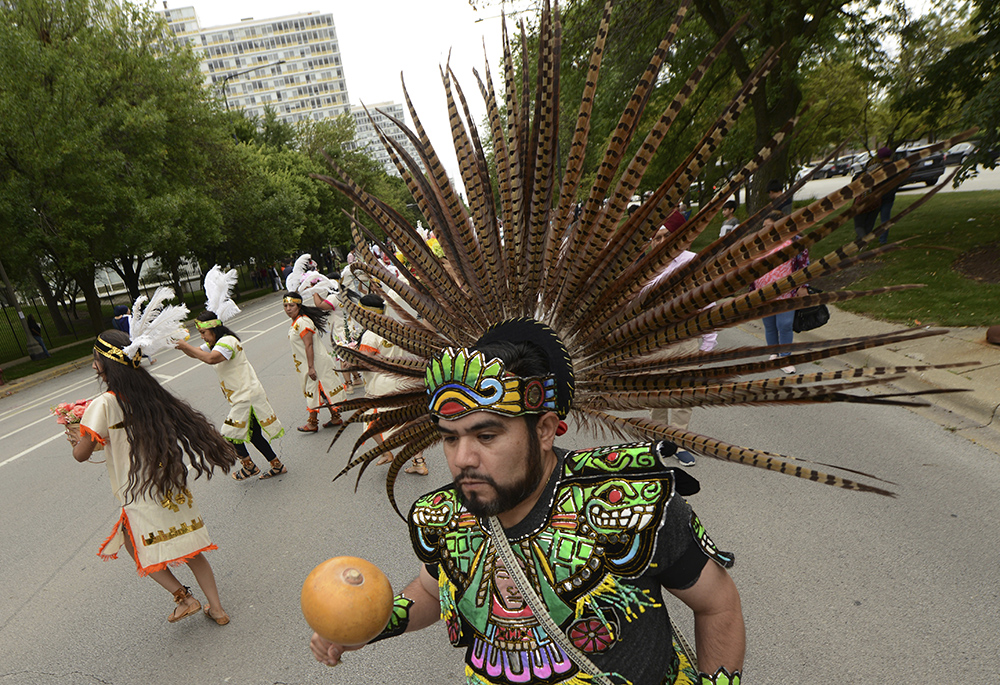
Members of the Cristo Rey Parish perform during the Parade of Faiths for the Parliament of the World's Religions, Aug. 13 in Chicago. (AP photo/Paul Beaty)
As morning storm clouds cleared over Lake Michigan Aug. 17, leaders from more than a dozen Christian faith traditions gathered by the shore to sign an ecumenical declaration on care for creation. The event was part of the 2023 Parliament of the World's Religions held in Chicago Aug. 14-18, and the 13 leaders who signed this particular declaration were but a small sampling of the approximately 200 belief systems and 6,000 religious leaders represented at the Parliament.
Two days earlier, faith leaders from around the world gathered along the Chicago lakeshore for a climate repentance ceremony where members from Muslim, Hindu, Jewish, Sikh, Jain, Buddhist and Christian communities read 10 spiritual practices for addressing climate change. Among them: "We must care for each other and the planet."
The camaraderie and collaborative pursuit of the common good is a marker of the interfaith gathering, and this year's theme of "A Call to Conscience: Defending Freedom and Human Rights," placed ecological concerns prominently throughout the weeklong program.
It's not the first time in recent years that faith leaders from around the world have gathered to join forces in advocating for effective climate action. But it is one of the latest iterations of a multifaith approach to addressing climate change and related issues that's thankfully been becoming the norm.
We need interfaith climate action to continue with increased intensity, like the extreme weather events, which according to Matteo Bruni, director of the Holy See Press Office, will be the focus of Pope Francis' reported update to his landmark ecological encyclical "Laudato Si', on Care for Our Common Home."
In 2021 ahead of the United Nations climate change conference in Glasgow, COP26, nearly 40 heads of major religions, including Pope Francis, issued what was at the time considered an unprecedented joint appeal calling for governments to cut greenhouse gas emissions — the leading drivers of climate change that result from burning fossil fuels.
And last year in Montreal at COP15 marked the first time faith-based organizations held an official side event at a U.N. biodiversity conference, with hopes to raise their moral voices and contribute to implementation strategies for conservation initiatives.
Advertisement
At a Climate Action Assembly on Aug. 18, Emily Echevarria, director of climate action for the Parliament of the World's Religions, encouraged faith leaders in attendance to support three more initiatives: the Plastics Treaty, the Fossil Fuel Non-Proliferation Treaty (which more than 50 religious institutions backed ahead of the U.N. climate change conference, COP27, in Sharm el-Sheikh, Egypt, last year) and the Faiths for Biodiversity Statement.
Because access to a healthy environment is a human right, "defending freedom and human rights means taking action on climate now," said Karenna Gore, founder and executive director of the Center for Earth Ethics at Union Theological Seminary, during the assembly. She added that approaching that work from a place of interconnection "can be a force for good."
"Alone is not enough," said Anna Thurston, research associate at Yale University's Forum on Religion and Ecology, during an Aug. 17 panel discussion titled "Interreligious Ecological Collaboration: Partnerships as Spiritual Practice." "We need each other," she said, not just to do this work in a practical sense, but also to live out the type of mutual relationship required by ecological spirituality.
"Partnerships are practical, but also they provide spiritual nourishment," she said.
It doesn't make sense for faith groups to approach climate action only from their own respective traditions. As Pope Francis said in Laudato Si', "We need a conversation which includes everyone, since the environmental challenge we are undergoing, and its human roots, concern and affect us all. … We require a new and universal solidarity."
The vital work of care for creation must be done together, and in working together across denominational lines, people of faith take the first step toward the integral ecology about which Francis so often speaks.







